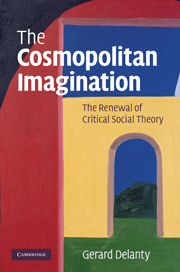Book contents
- Frontmatter
- Contents
- Preface and acknowledgements
- Introduction
- 1 The rise and decline of classical cosmopolitanism
- 2 Contemporary cosmopolitanism and social theory
- 3 Global ethics, solidarity and the problem of violence
- 4 Cosmopolitan citizenship and the post-sovereign state
- 5 Multiculturalism from a cosmopolitan perspective
- 6 Religion in a cosmopolitan society
- 7 Cosmopolitanism, modernity and global history
- 8 Cosmopolitanism and European political community
- 9 Europe as a borderland
- 10 Conclusion: inter-cultural dialogue in a post-Western world
- Bibliography
- Index
3 - Global ethics, solidarity and the problem of violence
Published online by Cambridge University Press: 18 January 2010
- Frontmatter
- Contents
- Preface and acknowledgements
- Introduction
- 1 The rise and decline of classical cosmopolitanism
- 2 Contemporary cosmopolitanism and social theory
- 3 Global ethics, solidarity and the problem of violence
- 4 Cosmopolitan citizenship and the post-sovereign state
- 5 Multiculturalism from a cosmopolitan perspective
- 6 Religion in a cosmopolitan society
- 7 Cosmopolitanism, modernity and global history
- 8 Cosmopolitanism and European political community
- 9 Europe as a borderland
- 10 Conclusion: inter-cultural dialogue in a post-Western world
- Bibliography
- Index
Summary
In this chapter I argue that one major dimension of cosmopolitanism is a concern with global ethics. Global ethics has a critical and dialogic character rather than being primarily grounded in ‘thin’ universalistic principles that transcend specific contexts. For this reason the question of global ethics is particularly interesting for critical social theory, which has been traditionally concerned with the critique of the present from the perspective of a critical-normative idea of the just society. As argued in the previous chapter, cosmopolitanism emerges out of shifts in the moral and political self-understanding of society and as such is a form of immanent transcendence whereby societies undergo change as a result of internal transformation as they respond to external and especially global challenges. It contains a strong ethical character and one that has a global frame of reference. Global ethics is above all an expression of cosmopolitan political community and can be seen as a multi-layered form of socio-cultural transformation. In the terms of the analysis in the preceding chapter, global ethics concerns the capacity to create a shared normative culture. It is not merely a product of a belief in global humanity and thus ‘thin’ (Dobson 2006). Societies can learn through ethics in the sense of shifts in their moral consciousness as a result of confronting common problems: collective learning takes the form of cognitive shifts which are primarily worked out in the communicative processes of the public sphere and shape collective identities.
- Type
- Chapter
- Information
- The Cosmopolitan ImaginationThe Renewal of Critical Social Theory, pp. 89 - 110Publisher: Cambridge University PressPrint publication year: 2009



